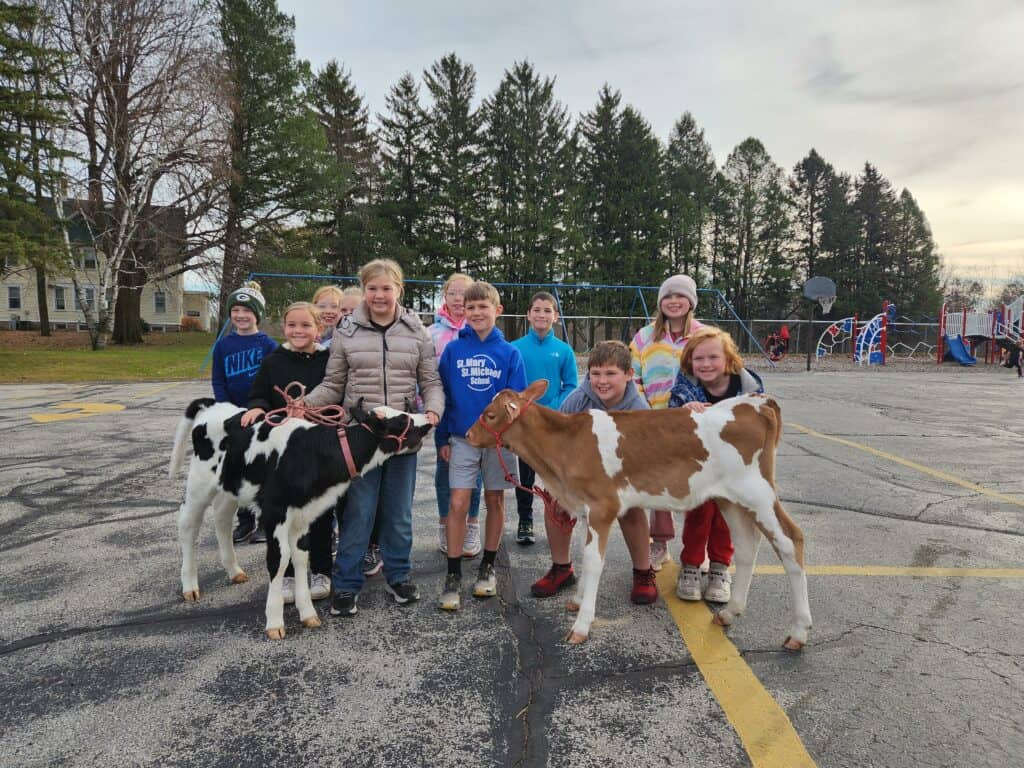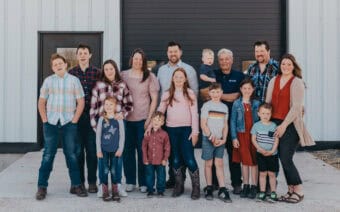
August 12, 2024
REEDSVILLE – Born and raised on a dairy farm in Manitowoc County, third-generation farmer Tiffany Kohlmann said she couldn’t imagine doing anything else.
“Farming is in my blood,” she said. “Growing up on a farm and being around it your whole childhood, you don’t think about doing anything else.”
Though, the life of a farmer isn’t always smooth sailing – which has been especially true for the Kohlmann family.
“My grandparents originally farmed on our current farm – Misty Moon Dairy,” she said. “My parents (Tony and Bonnie) bought in in 1996 – we had about 60 cows we were milking in a double six herringbone parlor.”
Unfortunately, in 2004 – “the summer between eighth grade and my freshman year” – a tornado hit Misty Moon Dairy.
“The tornado basically took everything down – all the barns, the silos,” she said.
Following the tornado, Kohlmann said her parents were faced with the decision – rebuild or sell.
“At that point, my brother and I wanted to continue the farm (when we graduated high school), so my parents ended up rebuilding – they put in a free-style barn and doubled their herd,” she said.
When Kohlmann graduated high school in 2008, she said she bought into the farm, becoming an owner with her parents.
She attended the University of Wisconsin-Madison’s Farm and Industry Short Course – a program offering various professional development and skills-building trainings for farmers and other agricultural professionals looking to expand their knowledge, technical proficiencies and management skills.
“I was there for two years,” she said.

Kohlmann said when her brother, Jarod, graduated from high school two years later, he followed in her footsteps – bought into the family farm and attended Short Course in Madison.
“We’ve been farming ever since,” she said.
When she returned to the farm after college, Kohlmann said they installed a double 10-swing parallel parlor – which she said, as the name suggests, means cows stand parallel to each other.
At that time, Kohlmann said Misty Moon Dairy had a handful of farm hands, but over time, it became just her and Jarod – which eventually prompted the brother-sister duo to install robot milkers.
“In September 2019, we put in two Lely robots,” she said. “Then in April 2020, we put in the second two. We now milk 240 cows with four Lely robots.”
Being your own boss
Kohlmann said one of the aspects of farming she enjoys the most is being her own boss.
“The tasks are the same, but yet it’s different daily,” she said. “Nothing is ever set in stone.”
With the milking robots, Kohlmann said she has more freedom to tackle farm chores on her schedule.
“You can do chores early, you can do them later in the afternoon – it all depends on your schedule,” she said. “With it just being family on the farm, someone always has to be around – however, you can plan chores around events you may have planned. You don’t have to make sure milkers show up. You don’t have to milk at a certain time. That is something we found convenient with the robots.”
With the good, Kohlmann said, comes the challenging.
“Taking a full family vacation is basically non-existent,” she said. “It’s difficult finding people who understand the robots – so finding folks to fill in doesn’t typically happen.”
Milk prices, Kohlmann said, are also a challenging aspect of life as a dairy farmer.
“We’re getting paid per hundredweight the same as our grandparents were,” she said. “When everybody goes to their boss and demands more, say they need a raise – farmers can’t do that, yet all their input costs are still increasing. We buy everything at retail and sell everything wholesale.”
Recognition
Life on the farm, Kohlmann said, is rarely accompanied by recognition.
To put a spotlight on some of the farmers excelling in the industry, each year, the Wisconsin Farm Bureau Federation’s (WFBF) Young Farmer and Agriculturist (YPA) names four finalists for its Farming for the Future Award.
The award recognizes YFA members who excel in their farm involvement, future goals, leadership abilities and participation in Farm Bureau and other civic and service organizations.

WFBF President Brad Olson said this year’s finalists are innovative leaders in Wisconsin’s farming community.
“We are excited to recognize young farmers who are advancing the future of agriculture,” he said.
Kohlmann is one of the finalists this year.
Other finalists include: Jacob and Eliza Bobolz (Rock County); Jacob and Jennifer Hoewisch (Waupaca County); and Josh and Kristen Joseph (Richland County).
A winner will be announced at the 2024 WFBF Annual Meeting and YFA Conference in early December.
Though she applied for the recognition, Kohlmann said she didn’t think she’d ever be chosen as a finalist.
In fact, she said she didn’t know she was selected as a finalist until a friend of hers sent the press release from the bureau’s announcement.
“I was shocked I was chosen as a final four,” she said. “The day before the announcement, one of the directors asked for my profile pictures for a ‘project,’ but I didn’t catch on.”
Though she is unsure why she was named a finalist, Kohlmann said she is involved in the ag in the classroom program through the bureau.
“This past year, I took two calves to my nephew’s school – it’s a parochial school with about 100 kids total in K through eighth grade – in the fall, and I brought the same calves back in the spring to show them how much a cow grows during the school year,” she said.
Kohlmann said she plans to do that again at her nephew’s school this fall and hopes to extend the experience to other schools in the region.
“Milk Marketing (through the bureau) has an adopt a calf program, which I got (my nephew’s school) started on, but (bringing the calves to the school) was an extra touch of bringing ag to the classroom so students could physically touch the calf,” she said.
Last year, Kohlmann said she also invited the students from her nephew’s school to tour the farm.
“It was a great opportunity for us to show students a behind-the-scenes look at dairy farming,” she said.

Kohlmann said transiting through different parlor systems and eventually to milking robots, is likely another reason for the recognition.
“Not everybody can progress that quickly in one generation,” she said.
Though she’s never needed recognition for the work she does, Kohlmann said she sees the value in spotlighting the hard-working men and women of the agricultural industry.
“Even though you don’t think your story is worth telling, it is,” she said.
Kohlmann said recognition by the bureau – whether she is selected as the winner or not – “is reassurance to keep going.”
“Some days, this industry is hard to be in,” she said. “So, giving out these awards reassures farmers their life goals are worth it, and they are making a difference.”
Importance of ag education
Farming today, Kohlmann said, encompasses many more opportunities for students than it did 10, 15 or 20 years ago.
“With the robots, there’s so many jobs attached to technology,” she said. “You don’t have to work on a farm to be a part of the ag industry. There are so many opportunities with technology in agriculture. We also need veterinarians, nutritionists, managers, folks who can fix the robots, etc.”
Getting the younger generations interested now, Kohlmann said, can start sparking those ideas.
“They often say, ‘the farmer wears many caps’ – while that is true, we still need support in other areas,” she said.
A fourth generation?
Kohlmann said her two nephews – “my sister’s kids” – are at the farm pitching in daily – “they get off the bus here after school.”
Though time will tell, she said, “they are active in the farm today,” to the possibility of passing the farm down to a fourth generation.
 Bank First earns accolades from Forbes, customers alike
Bank First earns accolades from Forbes, customers alike 2023 marks record-breaking year for tourism
2023 marks record-breaking year for tourism






